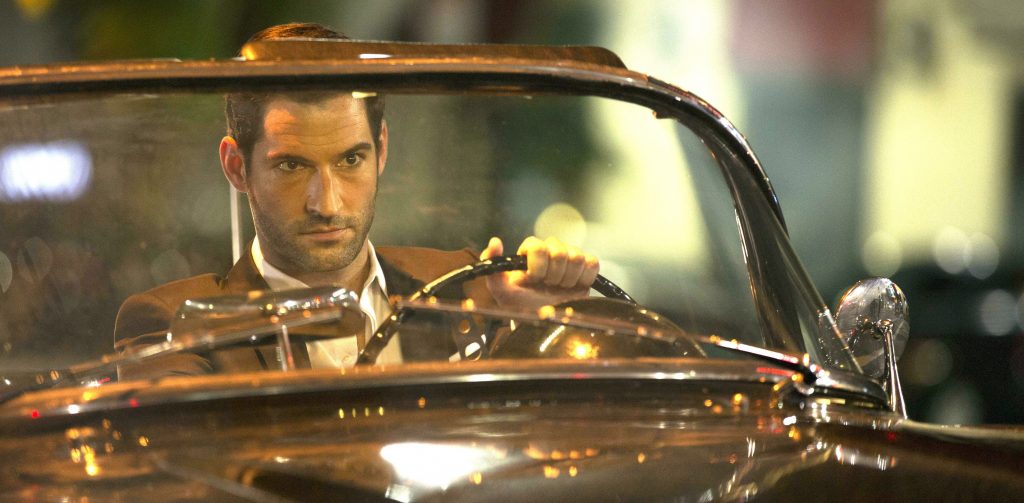Sympathy for the Devil: A Fresh Look at the Revived LUCIFER

[guest post by Isa Gunther]
“Just as every cop is a criminal
And all the sinners saints
As heads is tails
Just call me Lucifer
‘Cause I’m in need of some restraint”
~Rolling Stones, Sympathy for the Devil.
“Mommy, what’s a ‘hooker?’”
“Daddy’ll tell you.”
I would never have thought that two lines in a YouTube video could lead down such a darkly amusing rabbit hole, yet less than a month after seeing that initial scene, I find myself binge watching the show it was from.
Lucifer, at least his current incarnation, began life in a comic book. He was a recurring character, a mere cameo, in Neil Gaiman’s Sandman series. This one-off character became more prevalent until he got his own spin off series, called Lucifer, which followed him as he resigned his place as Lord of Hell and moved to Los Angeles (because where else would the Devil hang out but in the City of Angels?), ran a piano bar turned nightclub called Lux, and occasionally carried out missions for Higher Powers.
The mythological world of Gaiman’s Lucifer drew less from Christianity and more from older religions and beliefs, most notably the Kabbalah. Here, God and His angels co-exist with Native American spirits, Norse gods, and demons, as well as humans who unknowingly cross their paths.

The television series premiered midseason on Fox, got canceled after three seasons for “ratings-based reasons,” according to the network, and was rescued by a fan-fueled “#SaveLucifer” campaign that ended in Netflix picking up the series. Unlike the comics, the series takes Lucifer out of his solitary life. While he still has Lux, as well as a few angel and demon associates, he is much more of a free agent content with his club and sometimes allies.
The metamorphosis from noir comic to buddy cop television show would be counter-intuitive for most subjects.
Lucifer, however, manages to navigate the change with ease. Pairing the Devil up with a detective and her team has roots in shows like The Mentalist, which aired on CBS from 2008 until 2015, with a baffled police force inviting a quirky “civilian consultant” to assist with their cases. But where The Mentalist relied on the wit and charisma of its title character to solve the crimes, Lucifer relies on all of its characters to make it work. The title character, far from being an omniscient deus ex machina, is an addition to the team and fails almost as often as he succeeds. The other characters learn from Lucifer as he learns from them. The characters become people that the audience genuinely cares about, rather than the stereotypes that are common in cop procedurals.
With so much working in its favor, it’s no surprise that Lucifer has gathered a fandom that, while small, is fierce and loyal enough that they convinced Netflix to give their show a second chance at life. At the same time, however, it is in an unenviable position: While it has gotten a reprieve from cancellation and has an obviously sound fan base, it needs to tread carefully to maintain the balance that has made it so effective and beloved.
Production on its fourth (and unexpected) season has wrapped, and speculations about the coming episodes have been circulating around the gossip hotspots; the cast and crew themselves have been tweeting not-quite-spoilers and tantalizing hints. The rumors mention a new “love life” for Lucifer with the Biblical Eve, or Lilith, or some amalgam of the two. Or the relationship could be with his partner and sometimes-keeper, Chloe. Other rumors mention “heartbreak” for Lucifer and someone close to him.
Fans have been sounding off on their opinions of the rumors, especially the idea of a relationship between the two leads, which is unfortunate for both the fans and the show. While the gossip focuses on relationships and the Big Bad, Lucifer is more than just another one-note police procedural. It allows its characters to develop into more than who they were in the beginning; Lucifer begins as a playboy who only cares about himself. And while it takes a tragic personal loss for him to lead him to work with the police, through his experiences, he grows into a much deeper person. That is Lucifer‘s greatest strength, and that is what will not only keep people watching, but bring new viewers in.
Lucifer is a series that has made itself into that most rare of television events: a show with both humor and heart. It more than deserves the chance it has been given to shine.
Isa Gunther has been a keen participant in and observer of fandom for over a decade. She has worked directly with talent, producers, and Showrunners as a liaison between them and the fans. She has moderated panels at several conventions including Dragon*Con, and has a passion for how fans and their shows interact.




